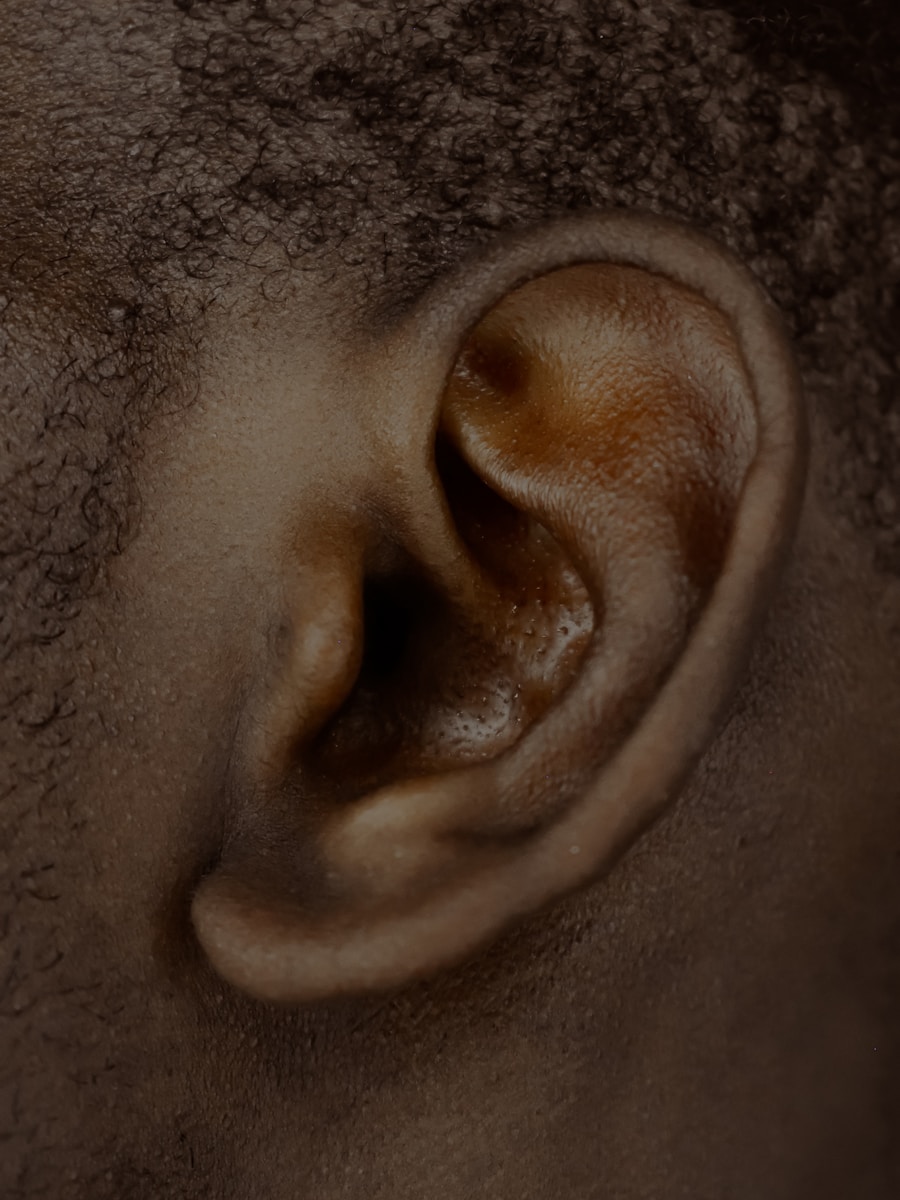How to Get Water Out of Ear: Effective Techniques
Experiencing water trapped in your ears can be a frustrating and uncomfortable sensation. Whether it’s due to swimming, showering, or any other water-related activity, it’s important to know how to safely and effectively remove water from your ears. In this article, we will explore some proven techniques that can help you get water out of your ear and find relief.
One of the most straightforward methods to remove water from your ear is the gravity technique. Start by tilting your head sideways and gently pull on your earlobe, creating a slight vacuum. Then, hop gently on one foot while keeping your tilted head position. This combination of gravity and shaking can often help dislodge the water and guide it out of your ear canal. Remember to be careful not to jump too vigorously, as it may cause the water to go deeper into your ear.
Another effective technique is using warm olive oil. Warm a small amount of olive oil and carefully pour a few drops into the affected ear. Allow the oil to sit for a few minutes, as it helps soften the earwax and promotes water drainage. Afterward, tilt your head sideways and let the oil and water drain out. You can repeat this process a few times if necessary.
Yawning or swallowing can also help equalize the pressure in your ears and encourage water to come out naturally. To do this, open your mouth wide and create a yawning motion or swallow repeatedly. This technique works by opening the Eustachian tubes, which connect the middle ear to the throat, allowing trapped water to escape.
If none of the above techniques work, you can try using a blow dryer on its lowest heat and air setting. Hold the dryer at arm’s length and position it a few inches away from your ear. Gently move the dryer in a back-and-forth motion to ensure the warm air reaches the trapped water. Be cautious not to use high heat or place the dryer too close to your ear, as it may cause burns or damage your eardrum.
It’s essential to avoid using cotton swabs, bobby pins, or any other sharp objects to remove water from your ears. These items can push the water deeper into the ear canal, potentially causing injury or damage. If you experience pain, dizziness, or persistent water blockage that doesn’t improve with home remedies, it’s advisable to seek medical attention.
Getting water trapped in your ear can be uncomfortable, but there are several effective techniques to help you find relief. The gravity technique, warm olive oil, yawning or swallowing, and using a blow dryer on low heat are all viable options. Remember to avoid inserting objects into your ear and seek professional help if necessary. By following these techniques, you can safely and successfully remove water from your ears, allowing you to enjoy activities without discomfort.
READ ALSO: How To Get Rid Of Cold Sores
Causes of Water Getting Stuck in Ears
Getting water stuck in your ears can be uncomfortable and even painful. Understanding the causes behind this common issue can help you prevent it from happening in the first place. Here are some of the main culprits:
Swimming or Water Activities
Engaging in water activities such as swimming, surfing, or showering can often lead to water getting trapped in your ears. This happens when water enters the ear canal and becomes trapped due to various factors.
Impacted Earwax
Excessive earwax buildup can also contribute to the problem. When earwax accumulates in the ear canal, it can create a barrier that prevents water from naturally flowing out. This can cause water to become trapped, leading to discomfort and even temporary hearing loss.
Inadequate Drying
Failing to properly dry your ears after exposure to water can be another cause of water getting stuck. If you don’t take the time to fully dry your ears with a towel or use a hairdryer on the lowest setting, any remaining moisture can linger and cause issues.
Ear Anatomy
Ear anatomy varies from person to person, and some individuals may be more prone to water getting stuck in their ears. Certain structural factors, such as narrow ear canals or excessive ear hair, can make it easier for water to become trapped.
Using Cotton Swabs
While cotton swabs might seem like a practical solution for cleaning your ears, they can do more harm than good. Inserting a cotton swab into your ear can push the water deeper, making it even more difficult to remove. It can also increase the risk of damaging your eardrum or causing an infection.
Ear Infections
In some cases, ear infections can lead to fluid accumulation, making it more likely for water to get trapped. If you’re prone to ear infections, take extra precautions to prevent water from entering your ears.
Preventing water from getting stuck in your ears is essential to maintaining ear health. By understanding the causes behind this issue, you can take appropriate measures to avoid it. Remember to dry your ears thoroughly, avoid using cotton swabs, and consider using earplugs when engaging in water activities. If you frequently experience water getting stuck in your ears or have any concerns, it’s always best to seek advice from a medical professional.
Prevention Tips for Avoiding Water in Ears
When it comes to enjoying water activities, one common annoyance that many people face is getting water trapped in their ears. It can be uncomfortable and even lead to temporary hearing impairment. Fortunately, there are preventive measures you can take to avoid this situation. By incorporating these simple tips into your routine, you can keep your ears dry and free from water-related troubles.
- Use Earplugs: Wearing earplugs is an effective way to prevent water from entering your ears while swimming or participating in water sports. There are different types of earplugs available in the market, such as silicone or wax, that provide a tight seal and keep water out. Make sure to choose earplugs that are suitable for your specific needs and activities.
- Tilt Your Head: After swimming or taking a shower, a simple technique to remove water from your ears is by tilting your head to the side. Gently pull on your earlobe and tilt your head in the opposite direction, allowing gravity to help drain the water out. You can also try hopping on one foot while tilting your head for added effect.
- Use a Towel: Drying your ears thoroughly after water activities is crucial. Use a soft towel to gently dry the outer part of your ears and the areas around them. Avoid inserting the towel into the ear canal, as this may push the water deeper inside and cause further complications.
- Dry Your Ears with a Blow Dryer: Another effective method to remove trapped water from your ears is by using a blow dryer on its lowest setting. Hold the dryer at least a foot away from your ear and blow warm air into the ear canal. Remember to keep the dryer at a safe distance to avoid burns or overheating.
- Ear Drops: Over-the-counter ear drops specifically designed to remove water from the ears can be a useful preventative measure. These drops contain drying agents that aid in evaporating any excess moisture in the ear canal.
- Avoid Inserting Cotton Swabs: It may be tempting to use cotton swabs or other objects to remove water from your ears, but this can actually push the water further inside and cause damage to your eardrum. Stick to using gentle methods like tilting your head or using gravity to facilitate drainage.
- Keep Your Ears Clean: Maintaining good ear hygiene is crucial to preventing water-related issues. Clean your ears regularly using a mild soap and warm water solution. Be careful not to insert anything into the ear canal, as this can disrupt the natural balance and protection of the ears.
By following these preventive tips, you can significantly reduce the chances of water getting trapped in your ears and enjoy your water activities worry-free. However, if you continue to experience persistent water blockage or any discomfort, it’s advisable to consult a healthcare professional for further evaluation and guidance.
Professional Advice: When to Seek Medical Help
When water gets trapped in your ear, it can be uncomfortable and even cause temporary hearing loss. In most cases, water will naturally drain out on its own. However, there are instances where you may need professional help. It’s important to recognize when seeking medical assistance is necessary to prevent complications and ensure your ear health.
One of the signs that you should seek medical help is if the water remains trapped in your ear for more than 48 hours. While it’s common for water to linger for a short period, an extended period of time can increase the risk of infection. If you notice symptoms such as pain, swelling, or discharge from your ear, it’s crucial to visit a healthcare professional.
Another indicator that you should consult a medical expert is if you have a history of ear infections or ear problems such as a perforated eardrum. These conditions can make you more susceptible to complications and require professional attention to remove the trapped water safely.
If you have tried various home remedies and none of them have been successful in removing the water from your ear, it’s time to seek medical advice. A healthcare provider will have the necessary tools and expertise to extract the water carefully, ensuring there is no damage to your ear canal or eardrum.
Additionally, if you experience dizziness, severe pain, or sudden hearing loss, it is essential to seek immediate medical attention. These symptoms could indicate a more serious underlying condition that requires prompt examination and treatment by a healthcare professional.
It’s important to remember that medical professionals are trained in diagnosing and treating ear-related issues. They have the knowledge and experience to identify any complications or infections that may arise from trapped water in your ear. Seeking medical help when necessary can provide you with peace of mind and help prevent any long-term consequences.
While most cases of water trapped in the ear resolve on their own, there are situations where seeking professional advice is crucial. Prolonged water retention, existing ear problems, unsuccessful home remedies, and severe symptoms all warrant a visit to a healthcare professional. Remember, your ear health is essential, and seeking medical help when needed is the best way to ensure proper treatment and prevention of complications.
Natural Remedies for Removing Water from Ears
It’s a common problem that many people face after swimming or taking a shower – water getting trapped in the ears. Not only can this be uncomfortable, but it can also increase the risk of developing an ear infection. While there are various techniques to remove water from the ears, some natural remedies can help speed up the process and provide relief. In this article, we will explore some effective natural remedies for removing water from ears.
One of the most popular natural remedies for getting water out of the ear is the “gravity method.” Simply tilt your head to the affected side and let gravity do its work. Gently pull on the earlobe and hop on one foot to create a slight vibration, which can help dislodge the water from the ear canal. After a few seconds, tilt your head in the opposite direction to allow the water to drain out. You may need to repeat this process a few times until the water is completely drained.
Another effective natural remedy is the use of heat. Applying heat to the affected ear can help evaporate the trapped water. You can use a warm compress or a heating pad set on low. Hold it against the ear for a few minutes, making sure not to apply too much heat. The warmth will help to draw out the moisture and alleviate discomfort. Remember to test the temperature of the compress or heating pad before applying it to the ear to avoid burns.
Hydrogen peroxide is also known to help remove water from the ears. It works by breaking down earwax and facilitating the elimination of water. To use this remedy, mix equal parts of hydrogen peroxide and water. Tilt your head to the side, and using a dropper, put a few drops of the mixture into the affected ear. Leave it in for a few minutes, then tilt your head in the opposite direction to let the solution and water drain out. Be sure to use only 3% hydrogen peroxide solution and avoid using this method if you have a perforated eardrum or any other ear condition.
Another natural remedy that may help is using a saline solution. Saltwater has natural properties that can help dissolve earwax and remove water from the ears. Mix a teaspoon of salt in a cup of warm water until it dissolves completely. Tilt your head to the side and use a dropper to put a few drops of the saline solution into the affected ear. Allow it to sit for a few minutes, then tilt your head in the opposite direction to let the solution and water drain out.
There are several natural remedies that can be effective in removing water from the ears. From the gravity method to the use of heat, hydrogen peroxide, and saline solution, these remedies can provide relief and help prevent complications such as ear infections. However, if your ear discomfort persists or worsens, it is essential to seek medical attention. A healthcare professional will be able to evaluate your condition and provide appropriate treatment if necessary.
Conclusion
Having water trapped in your ear can be an uncomfortable and frustrating experience. However, there are several effective techniques you can try to get rid of the water and alleviate any discomfort. By tilting your head and using gravity, creating a vacuum with your hand, or using a blow dryer on a low setting, you can effectively remove the water from your ear.
Understanding the causes of water getting stuck in your ears is also important in order to prevent future occurrences. Whether it’s due to swimming or showering, wearing earplugs or a swim cap can help minimize the chances of water entering your ear canal. Additionally, avoiding activities that involve rapid changes in water pressure, such as diving or flying, can also reduce the risk of water becoming trapped in your ears.
In order to prevent water from getting into your ears in the first place, there are a few simple tips you can follow. These include using earplugs or a swim cap when swimming, drying your ears thoroughly after bathing or swimming, and tilting your head to the side to help drain any remaining water. By incorporating these preventive measures into your routine, you can significantly reduce the likelihood of experiencing water in your ears.
While most cases of water in the ears can be resolved using home remedies and techniques, there are instances where seeking professional advice is necessary. If you experience persistent discomfort, pain, or if the water remains trapped in your ear for an extended period of time, it is advisable to consult a healthcare professional. They can provide a thorough examination of your ear and recommend appropriate treatment options to alleviate your symptoms.
If you prefer natural remedies, there are several options available to help remove water from your ears. These can include using a mixture of rubbing alcohol and white vinegar, using hydrogen peroxide, or utilizing the power of gravity by lying on your side with the affected ear facing down. These remedies can help break down earwax and dry out the trapped water, providing relief and restoring comfort.
While water in the ear can be a common occurrence, it can also be bothersome and uncomfortable. By understanding effective techniques for removing water from your ears, identifying the causes of water getting stuck, and following preventive measures, you can reduce the chances of experiencing this issue. It is important to remember that seeking professional advice is recommended in certain circumstances, and natural remedies can provide relief for those seeking an alternative approach. By taking proactive steps, you can ensure better ear health and enjoy water-related activities without the worry of water getting trapped in your ears.
Originally posted 2024-02-03 15:53:27.



